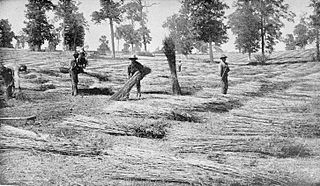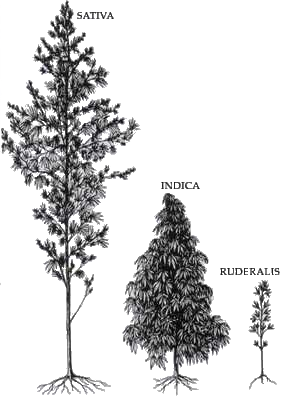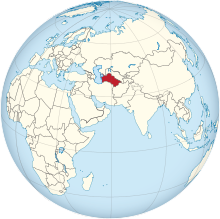
Cannabis is a genus of flowering plants in the family Cannabaceae. The number of species within the genus is disputed. Three species may be recognized: Cannabis sativa, C. indica, and C. ruderalis. Alternatively, C. ruderalis may be included within C. sativa, all three may be treated as subspecies of C. sativa, or C. sativa may be accepted as a single undivided species. The genus is widely accepted as being indigenous to and originating from Asia.

The Marihuana Tax Act of 1937, Pub. L.Tooltip Public Law 75–238, 50 Stat. 551, enacted August 2, 1937, was a United States Act that placed a tax on the sale of cannabis. The H.R. 6385 act was drafted by Harry Anslinger and introduced by Rep. Robert L. Doughton of North Carolina, on April 14, 1937. The Seventy-fifth United States Congress held hearings on April 27, 28, 29th, 30th, and May 4, 1937. Upon the congressional hearings confirmation, the H.R. 6385 act was redrafted as H.R. 6906 and introduced with House Report 792. The Act is referred to, using the modern spelling, as the 1937 Marijuana Tax Act. It was overturned in 1969 in Leary v. United States, and was repealed by Congress the next year.

Jack Herer, sometimes called the "Emperor of Hemp", was an American cannabis rights activist and the author of the 1985 book The Emperor Wears No Clothes. Herer founded and served as the director of the organization Help End Marijuana Prohibition (HEMP).

Hemp, or industrial hemp, is a plant in the botanical class of Cannabis sativa cultivars grown specifically for industrial and consumable use. It can be used to make a wide range of products. Along with bamboo, hemp is among the fastest growing plants on Earth. It was also one of the first plants to be spun into usable fiber 50,000 years ago. It can be refined into a variety of commercial items, including paper, rope, textiles, clothing, biodegradable plastics, paint, insulation, biofuel, food, and animal feed.

Hemp for Victory is a black-and-white United States government film made during World War II and released in 1942, explaining the uses of hemp, encouraging farmers to grow as much as possible. During World War II, the Marihuana Tax Act of 1937 was lifted briefly to allow for hemp fiber production to create ropes for the U.S. Navy but after the war hemp reverted to its de facto illegal status.

Cannabis flower essential oil, also known as hemp essential oil, is an essential oil obtained by steam distillation from the flowers, panicles, stem, and upper leaves of the hemp plant. Hemp essential oil is distinct from hemp seed oil and hash oil: the former is a vegetable oil that is cold-pressed from the seeds of low-THC varieties of hemp, the latter is a THC-rich extract of dried female hemp flowers (marijuana) or resin (hashish).

In the United States, increased restrictions and labeling of cannabis as a poison began in many states from 1906 onward, and outright prohibitions began in the 1920s. By the mid-1930s cannabis was regulated as a drug in every state, including 35 states that adopted the Uniform State Narcotic Drug Act. The first national regulation was the Marihuana Tax Act of 1937.
The plant name Cannabis is a Scythian word, which loaned into Persian as kanab, then into Greek as κάνναβις and subsequently into Latin as cannabis. The ancient Greeks learned of the use of cannabis by observing Scythian funerals, during which cannabis was consumed. In Assyrian, cannabis was known as qunubu. The word was adopted in to the Hebrew language as kaneh bosem. The Germanic word that gives rise to English hemp may be an early Germanic loan from the same source.

Cannabis in Portugal is decriminalized, as a result of the decriminalization of all drugs in Portugal in 2001. Medical use of cannabis was legalized in 2018.

Cannabis in Kentucky is illegal for recreational use, and legal for medical use under executive order, with full medical legalization statute taking effect in 2025. Non-psychoactive CBD oil is also legal in the state, and Kentucky has a history of cultivating industrial hemp for fiber since 1775.

Hemp juice is a beverage derived from industrial hemp, made from the result of pressing the Cannabis sativa plant. The juice is obtained through a large-scale industrial cold-pressing procedure using the upper parts of the hemp plant as well as the leaves. This procedure distinguishes hemp juice from other hemp products such as hemp oil, hemp sprouts or hemp milk, which are obtained through the seeds of the hemp plant.
Cannabis in Italy is currently legal for medical and industrial uses, although it is strictly regulated, while it is decriminalized for recreational uses. In particular, the possession of small amounts of marijuana for personal use is a civil infraction. The possible sanctions for possession vary from the issuing of a diffida to first offenders, that is an injunction not to use the drug again; to the temporary suspension of certain personal documents for repeat offenders. Conversely, the unauthorized sale of cannabis-related products is illegal and punishable with imprisonment, as is the unlicensed cultivation of cannabis, although recent court cases have effectively established the legality of cultivating small amounts of cannabis for exclusively personal use. The licensed cultivation of cannabis for medical and industrial purposes requires the use of certified seeds; however, there is no need for authorization to plant certified seeds with minimal levels of psychoactive compounds.

Cannabis has been cultivated in Japan since the Jōmon period of Japanese prehistory approximately six to ten thousand years ago. As one of the earliest cultivated plants in Japan, cannabis hemp was an important source of plant fiber used to produce clothing, cordage, and items for Shinto rituals, among numerous other uses. Hemp remained ubiquitous for its fabric and as a foodstuff for much of Japanese history, before cotton emerged as the country's primary fiber crop amid industrialization during the Meiji period. Following the conclusion of the Second World War and subsequent occupation of Japan, a prohibition on cannabis possession and production was enacted with the passing of the Cannabis Control Law.

Cannabis is illegal in Russia. Possession of up to 6 grams is an administrative offense, punishable by a fine or detention of 15 days. Possession of larger amounts is a criminal offense.

Cannabis in Ukraine is legal for medical purposes.
Hemp paper is a paper variety consisting exclusively or to a large extent from pulp obtained from fibers of industrial hemp. The products are mainly specialty papers such as cigarette paper, banknotes and technical filter papers. Compared to wood pulp, hemp pulp offers a four to five times longer fibre, a significantly lower lignin fraction as well as a higher tear resistance and tensile strength. Because the paper industry's processes have been optimized for wood as the feedstock, production costs currently are much higher than for paper from wood.

The following outline is provided as an overview of and topical guide to the plant Cannabis sativa and its relatives Cannabis indica and Cannabis ruderalis, the drug cannabis (drug) and the industrial product hemp.
'FINOLA' is a low THC hemp variety from Finland that is primarily used to produce hempseed.
Tochigishiro is a cultivar of hemp grown in Tochigi Prefecture, Japan. It meets international standards of non-narcotic agricultural hemp at about 0.2% THC, reckoned "remarkably low" by Sensi Seeds. It was grown in the early 20th century at Arlington Experimental Farm near the United States capital. The modern variety was developed beginning in 1973 by Kyushu University professor of pharmacy Itsuo Nishioka from seeds "found in southern Japan", and completed c. 1982 by the Tochigi prefectural government at Tochigi Agricultural Experiment Station in Tochigi-shi. According to a National Institute of Mental Health-affiliated researcher, the strain is missing the enzyme tetrahydrocannabinolic acid synthase that makes most Cannabis capable of producing THC. It is the most widely grown cultivar in Japan in the 21st century, being exempt from prohibition under the Cannabis Control Law, due to its low levels of psychoactive chemicals. Approximately 90% of the hemp grown in Japan is the Tochigishiro variety.










